初中英语代词情态动词总结及练习题
完整版初中英语情态动词讲解练习及答案
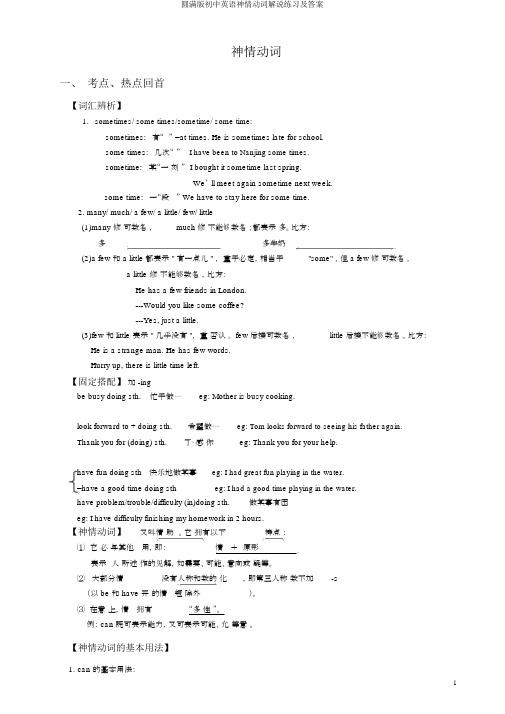
神情动词一、考点、热点回首【词汇辨析】1.sometimes/ some times/sometime/ some time:sometimes:有“ ” =at times. He is sometimes late for school.some times:几次“ ”I have been to Nanjing some times.sometime:某“一刻” I bought it sometime last spring.We’ ll meet again sometime next week.some time:一“段” We have to stay here for some time.2. many/ much/ a few/ a little/ few/ little(1)many 修可数名,much 修不能够数名;都表示多。
比方:多多牛奶(2)a few 和 a little 都表示 " 有一点儿 " ,重于必定,相当于"some" ,但 a few 修可数名,a little 修不能够数名,比方:He has a few friends in London.---Would you like some coffee?---Yes, just a little.(3)few 和 little 表示 " 几乎没有 ",重否认。
few 后接可数名,little 后接不能够数名。
比方:He is a strange man. He has few words.Hurry up, there is little time left.【固定搭配】加 -ingbe busy doing sth.忙于做⋯⋯eg: Mother is busy cooking.look forward to + doing sth.希望做⋯⋯eg: Tom looks forward to seeing his father again.Thank you for (doing) sth.了⋯感你eg: Thank you for your help.have fun doing sth快乐地做某事eg: I had great fun playing in the water.=have a good time doing sth eg: I had a good time playing in the water.have problem/trouble/difficulty (in)doing sth.做某事有困eg: I have difficulty finishing my homework in 2 hours.【神情动词】又叫情助。
初中情态动词知识点及习题(附答案)
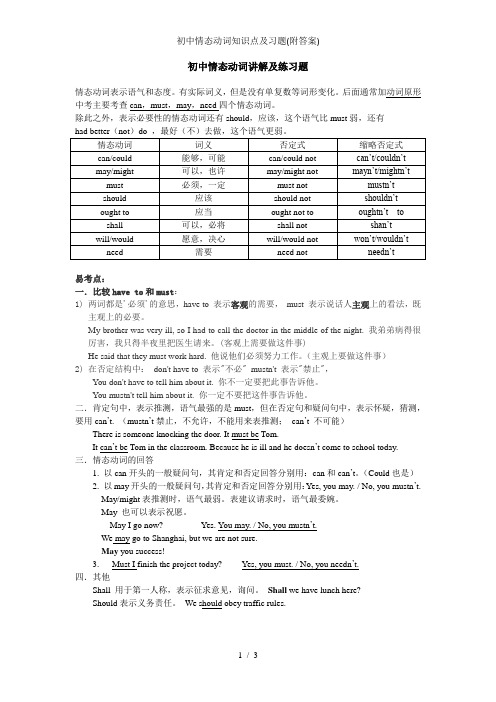
初中情态动词讲解及练习题情态动词表示语气和态度。
有实际词义,但是没有单复数等词形变化。
后面通常加动词原形中考主要考查can,must,may,need四个情态动词。
除此之外,表示必要性的情态动词还有should,应该,这个语气比must弱,还有易考点:一.比较have to和must:1) 两词都是'必须'的意思,have to表示客观的需要,must 表示说话人主观上的看法,既主观上的必要。
My brother was very ill, so I had to call the doctor in the middle of the night.我弟弟病得很厉害,我只得半夜里把医生请来。
(客观上需要做这件事)He said that they must work hard.他说他们必须努力工作。
(主观上要做这件事)2) 在否定结构中:don't have to 表示"不必" mustn't表示"禁止",You don't have to tell him about it. 你不一定要把此事告诉他。
You mustn't tell him about it. 你一定不要把这件事告诉他。
二.肯定句中,表示推测,语气最强的是must,但在否定句和疑问句中,表示怀疑,猜测,要用can’t. (mustn’t禁止,不允许,不能用来表推测;can’t 不可能)There is someone knocking the door. It must be Tom.It can’t be Tom in the classroom. Because he is ill and he doesn’t come to school today.三.情态动词的回答1. 以can开头的一般疑问句,其肯定和否定回答分别用:can和can’t。
初中语法:情态动词知识点练习题

初中语法:情态动词知识点练习题一、情态动词单项选择题1.There is no light on.They _______ be at home.A.mustn’t B.can’t C.needn’t【答案】B【解析】【分析】【详解】句意:没有一盏灯开着,他们不可能在家。
考查情态动词。
mustn’t禁止;can’t不可能;needn’t不必。
根据“There is no light on”没有一盏灯开着,可推知他们“不可能”在家,表示否定推测用can’t,故选B。
2.—I cannot find my pen. ________ I borrow yours?—Sure.A.Can B.Must C.Should D.Would【答案】A【解析】【详解】句意:——我找不到我的钢笔。
我可以借你的吗?——当然。
考查情态动词辨析。
can可以;must必须;should应该;would将。
根据“I borrow yours”可知,此处应用can表请求允许,希望能借对方的钢笔用一下,故选A。
3.—You ________ be more careful, or you will do it again.—OK, I see. Thank you.A.might B.can C.may D.should【答案】D【解析】【分析】【详解】句意:——你应该要更加细心,否则你要再做一次。
——好的,我明白了,谢谢。
考查情态动词。
might可能(may的过去式);can能,会;may可能、也许;should应该;根据语境可知此处指“应该更仔细”;故选D。
4.—Can Julie play chess?—________.A.Yes, she is B.No, sh e can’t C.Yes, she does【答案】B【解析】句意:——朱莉会下棋吗?——不,她不会。
考查情态动词的用法。
根据“Can Julie play chess?”是含情态动词can的一般疑问句,肯定回答用“Yes, 主语+can”;否定回答用“No, 主语+can’t”。
初中语法:情态动词知识点练习题

初中语法:情态动词知识点练习题一、情态动词单项选择题1.—Shall I tell him the change of the time right now?—I’m afraid you ________, otherwise he will be late for the meeting.A.can B.may C.must D.need【答案】C【解析】【详解】句意:——我现在就告诉他时间改变了,好吗?——恐怕你必须这么做,否则他开会就要迟到了。
考查情态动词辨析。
can能够,表能力或许可;may可以,表推测;must必须;need需要。
根据下文“otherwise he will be late for the meeting”,可知ABD三项不合语境,这里是说必须告诉他时间改了,故选C。
2.—I went to Mount Wudang last week. But there were too many people and it’s too hot.—It’s too bad. I think your trip ________ be unpleasant.A.c an’t B.should C.must D.need【答案】C【解析】【分析】【详解】句意:——我上周去了武当山。
但是人太多了,天气太热了。
——太糟糕了。
我想你的旅行一定很不愉快。
考查情态动词。
can’t不能;should应该;must一定;need需要。
根据“But there were too many people and it’s too hot.”判断,此次旅行一定是不愉快的,表示肯定的推测,用must be。
故选C。
3.________ you raise yo ur feet off the floor? I’d like to see if my pen is under the desk. A.Must B.Can C.Should D.May【答案】B【解析】【分析】【详解】句意:你可以把脚抬离地面吗?我想看看我的钢笔是否在课桌下面。
初中语法:情态动词知识点练习
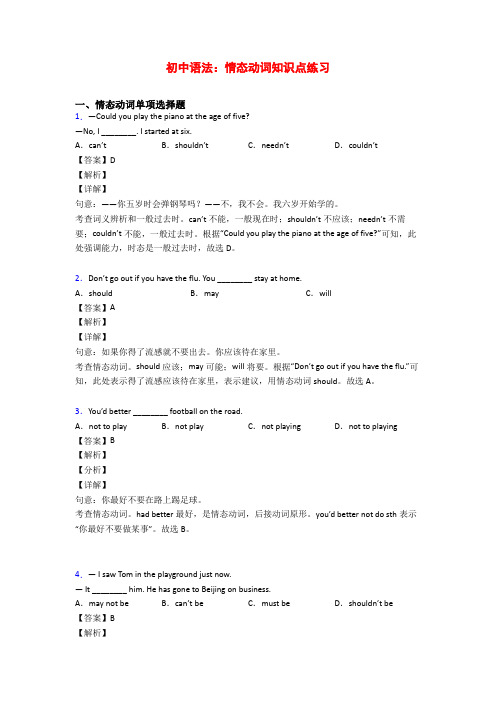
初中语法:情态动词知识点练习一、情态动词单项选择题1.—Could you play the piano at the age of five?—No, I ________. I started at six.A.can’t B.shouldn’t C.needn’t D.couldn’t【答案】D【解析】【详解】句意:——你五岁时会弹钢琴吗?——不,我不会。
我六岁开始学的。
考查词义辨析和一般过去时。
can’t不能,一般现在时;shouldn’t不应该;needn’t不需要;coul dn’t不能,一般过去时。
根据“Could you play the piano at the age of five?”可知,此处强调能力,时态是一般过去时,故选D。
2.Don’t go out if you have the flu. You ________ stay at home.A.should B.may C.will【答案】A【解析】【详解】句意:如果你得了流感就不要出去。
你应该待在家里。
考查情态动词。
should应该;may可能;will将要。
根据“Don’t go out if you have the flu.”可知,此处表示得了流感应该待在家里,表示建议,用情态动词should。
故选A。
3.You’d better ________ football on the road.A.not to play B.not play C.not playing D.not to playing【答案】B【解析】【分析】【详解】句意:你最好不要在路上踢足球。
考查情态动词。
had better最好,是情态动词,后接动词原形。
you’d better not do s th表示“你最好不要做某事”。
故选B。
4.— I saw Tom in the playground just now.— It ________ him. He has gone to Beijing on business.A.may not be B.can’t be C.must be D.shouldn’t be【答案】B【解析】句意:——我刚才看见汤姆在操场上。
初中英语情态动词练习题(含答案)
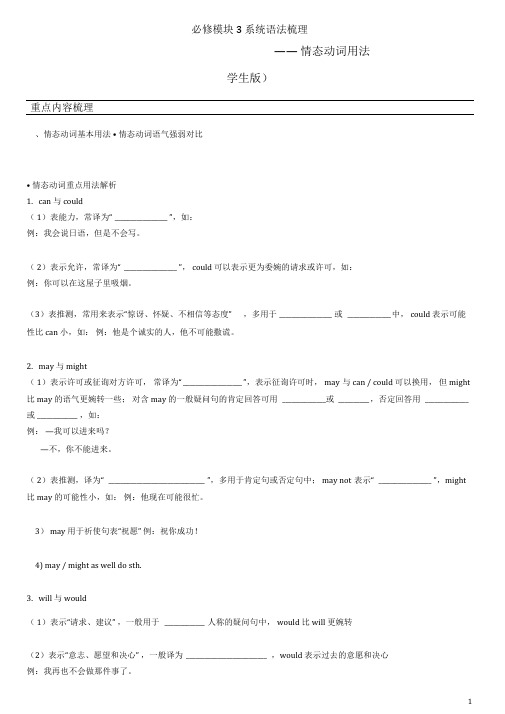
必修模块3 系统语法梳理——情态动词用法学生版)重点内容梳理、情态动词基本用法• 情态动词语气强弱对比• 情态动词重点用法解析1.can 与 could( 1)表能力,常译为“ _________________ ”,如:例:我会说日语,但是不会写。
( 2)表示允许,常译为“ _________________ ”, could 可以表示更为委婉的请求或许可,如:例:你可以在这屋子里吸烟。
(3)表推测,常用来表示“惊讶、怀疑、不相信等态度”,多用于_________________ 或______________ 中, could 表示可能性比 can 小,如:例:他是个诚实的人,他不可能撒谎。
2.may 与 might( 1)表示许可或征询对方许可,常译为“ ___________________ ”,表示征询许可时, may与 can / could 可以换用,但 might 比 may 的语气更婉转一些;对含 may 的一般疑问句的肯定回答可用 ______________ 或 __________ ,否定回答用 ______________ 或 _____________ ,如:例:—我可以进来吗?—不,你不能进来。
( 2)表推测,译为“ _______________________________ ”,多用于肯定句或否定句中; may not表示“ _________________ ”,might 比 may 的可能性小,如:例:他现在可能很忙。
3) may 用于祈使句表“祝愿” 例:祝你成功!4) may / might as well do sth.3.will 与 would( 1)表示“请求、建议” ,一般用于_____________ 人称的疑问句中, would 比 will 更婉转(2)表示“意志、愿望和决心” ,一般译为 __________________________ ,would 表示过去的意愿和决心例:我再也不会做那件事了。
初中英语情态动词详细用法归纳含练习及答案

初中英语情态动词详细用法归纳〔含练习及答案〕情态动词有具体的词义,但也同助动词一样,需要及其他词语一起构成句子的谓语,另外情态动词没有人称和数的变化,情态动词后必须跟动词原形。
1. 的用法:〔1〕.表示能力、许可、可能性。
表示能力时一般译为“能、会〞,即有种能力,尤其是生来具备的能力.如:, I ’t . 她能游得很快,但我不能。
I . 我用眼睛看。
是的过去式。
表示过去的能力。
. 常常指经过努力,花费了时间和劳力之后才能做到某事。
.〔2〕.表示许可,常在口语中。
如: . 你可以用我的字典。
〔3〕.表示推测,可能性,意为“可能〞,常用于否认句和疑问句中,此时’t 译为“ 不可能〞。
如: ? 这个消息会是真的吗?— ?那个人有可能是我们教师吗?—, ’t . a .不可能。
咱们教师正在游览长城呢。
【例题】—I . . —. , I . ’t ’t ’t ’t【解析】根据下文“我刚去过那儿〞可知,应为“ 不可能〞,’t 表示推测[答案] A的用法:〔1〕的过去式,意为“ 能、会〞,表示过去的能力。
如: 10. 他十岁时就会写诗。
〔2〕. 在疑问句中,表示委婉的语气,此时没有过去式的意思。
如a ? 你能帮我个忙吗?— I ? 我能用一下你的钢笔吗? —, .可以。
〔用问,不能用答。
〕2. 的用法:〔1〕.表示请求、许可,比正式,如: I ? 我可以借你的自行车吗? . 现在你可以回家了。
【例题】— I 3? — . . A. D.【解析】在此处表示请求,意为“ 做……可以吗〞。
答案:A(2) .表示推测,谈论可能性,意为“ 可能,或许〞,一般用于肯定句中。
如: . 明天可能会下雨。
. 她可能在家呢. 翻译为“可能不〞(3) 的过去式为,表示推测时。
可能性低于。
如: . .他离开学校了,可能是他生病了。
(4) . 表示希望、祈求、祝愿,常可译为“祝愿〞。
通常是用 +主例如: a . 祝你过得愉快。
! 祝你幸福!!祝你成功!3. 的用法:(1) 表示主观看法,意为“必须、一定〞。
初中英语情态动词详细用法归纳(含练习及答案)
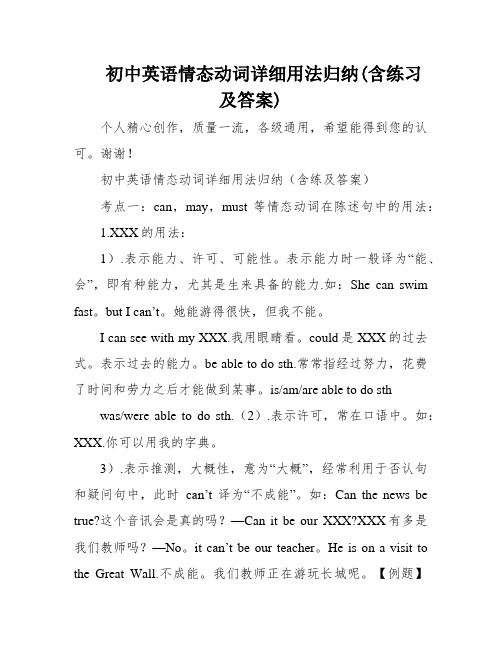
初中英语情态动词详细用法归纳(含练习及答案)个人精心创作,质量一流,各级通用,希望能得到您的认可。
谢谢!初中英语情态动词详细用法归纳(含练及答案)考点一:can,may,must等情态动词在陈述句中的用法:1.XXX的用法:1).表示能力、许可、可能性。
表示能力时一般译为“能、会”,即有种能力,尤其是生来具备的能力.如:She can swim fast。
but I can’t。
她能游得很快,但我不能。
I can see with my XXX.我用眼睛看。
could是XXX的过去式。
表示过去的能力。
be able to do sth.常常指经过努力,花费了时间和劳力之后才能做到某事。
is/am/are able to do sth was/were able to do sth.(2).表示许可,常在口语中。
如:XXX.你可以用我的字典。
3).表示推测,大概性,意为“大概”,经常利用于否认句和疑问句中,此时can’t译为“不成能”。
如:Can the news be true?这个音讯会是真的吗?—Can it be our XXX?XXX有多是我们教师吗?—No。
it can’t be our teacher。
He is on a visit to the Great Wall.不成能。
我们教师正在游玩长城呢。
【例题】—I think Miss Gao must be in the library。
She said she would go there.—No。
She __be there。
Ihave just been there.A.can’tB.XXX’t解析】按照下文“我刚去过那儿”可知,应为“不成能”,can’t表示推测[答案] Acould的用法:1).can的过去式,意为“能、会”,表示过去的能力。
如:He could write poems when he was 10.他十岁时就会写诗。
初中情态动词专题汇总复习:知识点总结 习题(含答案)
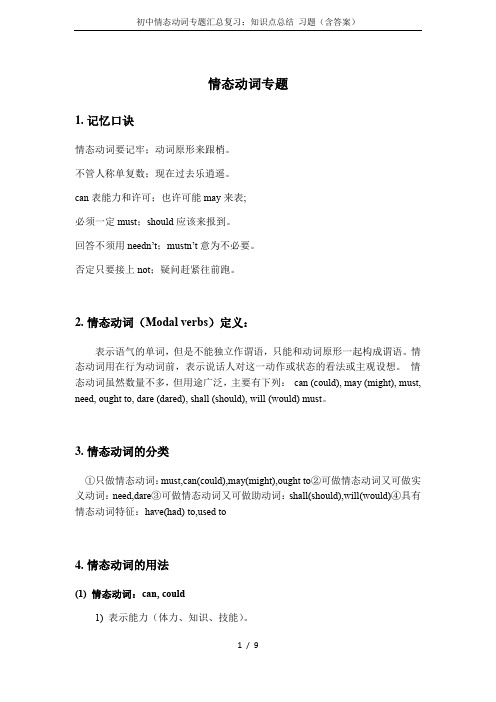
情态动词专题1.记忆口诀情态动词要记牢;动词原形来跟梢。
不管人称单复数;现在过去乐逍遥。
can表能力和许可;也许可能may来表;必须一定must;should应该来报到。
回答不须用needn’t;mustn’t意为不必要。
否定只要接上not;疑问赶紧往前跑。
2.情态动词(Modal verbs)定义:表示语气的单词,但是不能独立作谓语,只能和动词原形一起构成谓语。
情态动词用在行为动词前,表示说话人对这一动作或状态的看法或主观设想。
情态动词虽然数量不多,但用途广泛,主要有下列:can (could), may (might), must, need, ought to, dare (dared), shall (should), will (would) must。
3.情态动词的分类①只做情态动词:must,can(could),may(might),ought to②可做情态动词又可做实义动词:need,dare③可做情态动词又可做助动词:shall(should),will(would)④具有情态动词特征:have(had) to,used to4.情态动词的用法(1) 情态动词:can, could1) 表示能力(体力、知识、技能)。
Can you lift this heavy box?(体力)[注意1] 此时可用be able to代替。
Can只有一般现在时和一般过去式;而be able to则有更多的时态。
[注意2] 当表示“经过努力才得以做成功某事”时应用be able to,不能用Can。
如:He was able to go to the party yesterday evening in spite of the heavy rain.2) 表示请求和允许。
-----Can I go now?----- Yes, you can. / No, you can’t.[注意3] 此时可与may互换。
最新中考英语情态动词100及答案经典
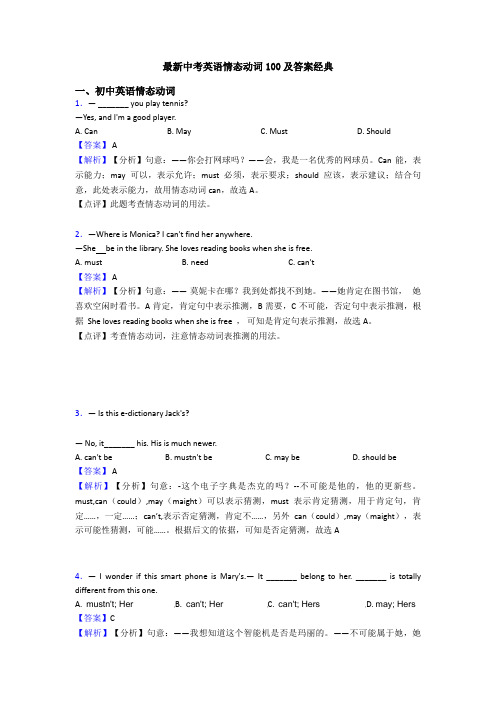
最新中考英语情态动词100及答案经典一、初中英语情态动词1.— _______ you play tennis?—Yes, and I'm a good player.A. CanB. MayC. MustD. Should【答案】 A【解析】【分析】句意:——你会打网球吗?——会,我是一名优秀的网球员。
Can能,表示能力;may可以,表示允许;must必须,表示要求;should应该,表示建议;结合句意,此处表示能力,故用情态动词can,故选A。
【点评】此题考查情态动词的用法。
2.—Where is Monica? I can't find her anywhere.—She be in the library. She loves reading books when she is free.A. mustB. needC. can't【答案】 A【解析】【分析】句意:——莫妮卡在哪?我到处都找不到她。
——她肯定在图书馆,她喜欢空闲时看书。
A肯定,肯定句中表示推测,B需要,C不可能,否定句中表示推测,根据 She loves reading books when she is free ,可知是肯定句表示推测,故选A。
【点评】考查情态动词,注意情态动词表推测的用法。
3.— Is this e-dictionary Jack's?— No, it_______ his. His is much newer.A. can't beB. mustn't beC. may beD. should be【答案】 A【解析】【分析】句意:-这个电子字典是杰克的吗?--不可能是他的,他的更新些。
must,can(could),may(maight)可以表示猜测,must表示肯定猜测,用于肯定句,肯定……,一定……;can’t,表示否定猜测,肯定不……,另外can(could),may(maight),表示可能性猜测,可能……。
初中英语十大词性详解和练习
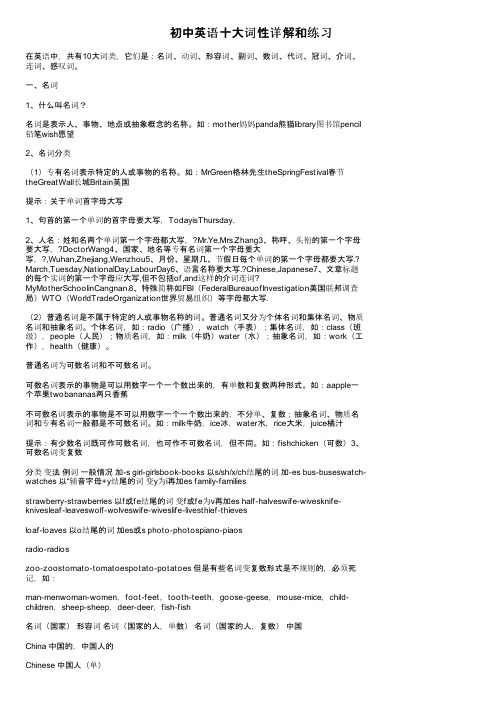
初中英语十大词性详解和练习在英语中,共有10大词类,它们是:名词、动词、形容词、副词、数词、代词、冠词、介词、连词、感叹词。
一、名词1、什么叫名词?名词是表示人、事物、地点或抽象概念的名称。
如:mother妈妈panda熊猫library图书馆pencil 铅笔wish愿望2、名词分类(1)专有名词表示特定的人或事物的名称。
如:MrGreen格林先生theSpringFestival春节theGreatWall长城Britain英国提示:关于单词首字母大写1、句首的第一个单词的首字母要大写,TodayisThursday.2、人名:姓和名两个单词第一个字母都大写,?Mr.Ye,Mrs.Zhang3、称呼、头衔的第一个字母要大写,?DoctorWang4、国家、地名等专有名词第一个字母要大写,?,Wuhan,Zhejiang,Wenzhou5、月份、星期几、节假日每个单词的第一个字母都要大写.? March,Tuesday,NationalDay,LabourDay6、语言名称要大写.?Chinese,Japanese7、文章标题的每个实词的第一个字母应大写,但不包括of,and这样的介词连词? MyMotherSchoolinCangnan.8、特殊简称如FBI(FederalBureauofInvestigation美国联邦调查局)WTO(WorldTradeOrganization世界贸易组织)等字母都大写.(2)普通名词是不属于特定的人或事物名称的词。
普通名词又分为个体名词和集体名词、物质名词和抽象名词。
个体名词,如:radio(广播),watch(手表);集体名词,如:class(班级),people(人民);物质名词,如:milk(牛奶)water(水);抽象名词,如:work(工作),health(健康)。
普通名词为可数名词和不可数名词。
可数名词表示的事物是可以用数字一个一个数出来的,有单数和复数两种形式。
初一英语情态动词知识点归纳 含答案
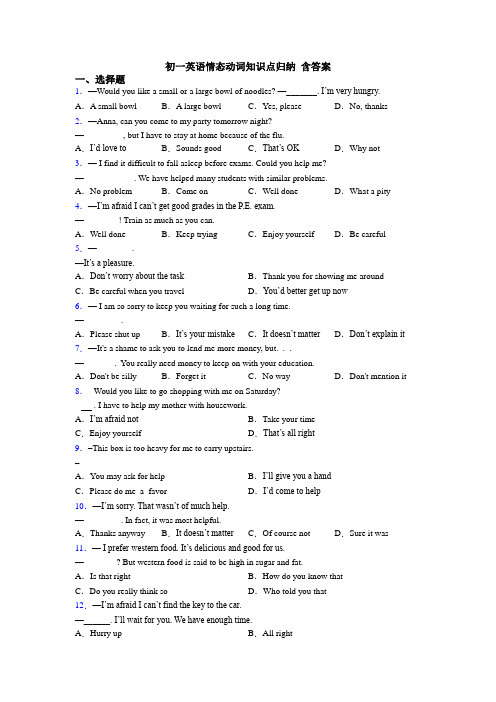
初一英语情态动词知识点归纳含答案一、选择题1.—Would you like a small or a large bowl of noodles? —_______. I’m very hungry.A.A small bowl B.A large bowl C.Yes, please D.No, thanks 2.—Anna, can you come to my party tomorrow night?—_________, but I have to stay at home because of the flu.A.I’d love to B.Sounds good C.That’s OK D.Why not 3.— I find it difficult to fall asleep before exams. Could you help me?— ___________. We have helped many students with similar problems.A.No problem B.Come on C.Well done D.What a pity 4.—I’m afraid I can’t get good grades in the P.E. exam.—________! Train as much as you can.A.Well done B.Keep trying C.Enjoy yourself D.Be careful 5.—________.—It’s a pleasure.A.Don’t worry about the task B.Thank you for showing me around C.Be careful when you travel D.You’d better get up now6.— I am so sorry to keep you waiting for such a long time.— ________.A.Please shut up B.It’s your mistake C.It doesn’t matter D.Don’t explain it 7.—It's a shame to ask you to lend me more money, but. . .— ______ . You really need money to keep on with your education.A.Don't be silly B.Forget it C.No way D.Don't mention it 8.--Would you like to go shopping with me on Saturday?-- . I have to help my mother with housework.A.I’m afraid not B.Take your timeC.Enjoy yourself D.That’s all right9.–This box is too heavy for me to carry upstairs.–__________A.You may ask for help B.I’ll give you a handC.Please do me a favor D.I’d come to help10.—I’m sorry. That wasn’t of much help.— ________. In fact, it was most helpful.A.Thanks anyway B.It doesn’t matter C.Of course not D.Sure it was 11.—I prefer western food. It’s delicious and good for us.—_______ ? But western food is said to be high in sugar and fat.A.Is that right B.How do you know thatC.Do you really think so D.Who told you that12.—I’m afraid I can’t find the key to the car.—______. I’ll wait for you. We have enough time.A.Hurry up B.All rightC.It is up to you D.Hold your horses13.— Could you please clean your room?—_________. I’ll do it at once.A.Yes, sure B.Sorry, I can’t C.It doesn’t matter D.Here you are 14.—Liz, I’d like to take a week’s holiday.—________. We’re as busy as a bee.A.Go ahead B.With pleasure C.Forget it D.That’s right 15.-Do you mind telling me how to use this function? - . It’s easy. Just double-click on the “Pencil” icon.A.No, not at all B.Of course, I doC.Yes, I do D.Yes, I don’t16.—Would you please help me with my spoken English?—__________. First you should know practice makes perfect.A.That’s right B.No problem C.Quite well D.No, thanks 17.—I have got a new job as a presenter in the Wenzhou Radio Station!—________.A.Come on B.Good idea C.Congratulations D.All right 18.—Sir, this is your order, two chicken hamburgers and a cup of coffee. ________—I’ll have them here.A.For here or to go? B.Something to drink? C.Anything else? D.Is that OK? 19.—I missed the basketball game last Saturday because I had an exam.—________, but it will be repeated on TV.A.Take it easy B.You are lucky C.That’s wonderfu l D.Never mind 20.—Do you like cartoons or scary movies?—_______. They can cheer me up.A.Yes, I do B.No, I don't C.Cartoons D.Scary movies 21.—I’m sorry I didn’t make it to your birthday party last night.— ________ I know you are busy recently.A.Why not? B.Don’t mention it.C.No way. D.That’s all right. 22.—You seem so happy today, Jack.—________? I won the first prize in the singing competition yesterday.A.So what B.How come C.Guess what D.Why not 23.—Jim seems to be in low spirits. ________?—No one liked his plan. All his efforts were useless.A.Guess what B.What about him C.So what D.What happened 24.—________. Where’s the nearest supermarket?—Oh, it’s about 300 meters away, next to a park.A.Thank you B.Excuse me C.Come on D.That’s OK 25.-Do you think the rain will stop tomorrow?-_____. It has rained for four days. It’s too wet everywhere.A.I hope not B.I don’t think soC.Don’t worry D.I hope so26.—I wonder if Tenny is doing well in her new school.—________. She is old enough to look after herself well.A.You’re welcome B.Good luck C.It’s a pity D.No need to worry 27.—All of Mark Twain’s novels are popular.— ________. Especially The Adventures of Tom Sawyer.A.I can’t agree more B.That’s not the case C.That’s not the point D.Don’t mention i t 28.—Could you help me look after my baby ________ I am away?—________.A.as; With pleasure B.while; My pleasure C.as; That’s all right D.while; With pleasure29.—How would you like your soup?—________.A.Very delicious B.With some tomatoes and eggs, please C.I like it very much D.No, thanks30.—Don’t keep the water running when you brush your teeth.— ________ .A.I hope so B.I’m afraid not C.Sorry, I won’t D.It’s nothing 31.—Would you mind if I open the window?—_______.We need fresh air.A.Not at all B.Yes, of course C.You’d better not D.That’s all right 32.—Shall we go to the amusement park right away or the day after tomorrow?—________. Any time will do.A.Excuse me B.Have a good timeC.It’s up to you D.I’m afraid I can’t33.—He is too short to be a successful basketball player.—________ Every dog has its day.A.I think so. B.It’s hard to say.C.That’s right.D.You’d better not. 34.— May I have a look at the newspaper China Daily?— Certainly. ________A.Thank you. B.It’s a pity.C.Here you are. D.I’d like to. 35.—I love the Internet. I’ve come to know many friends on the net.—________. Few of them would become your real friends.A.I can’t agree more B.I’m pleased to know thatC.That’s for sure D.That’s not the case36.—Hi, everybody! Here is the music.—________. Let’s dance to the music.A.That’s no good B.Here we go C.That’s a shame D.Have a good time 37.—Our family will go to Hangzhou for a holiday this summer.—________.A.Well done B.I am glad to hear thatC.Best wishes to you D.Have fun38.—________!—Yes. It sounds gentle and relaxing.A.How good the vegetable soup is B.How exciting the storybook isC.What nice music Ann is playing D.What a beautiful flower Jim keeps 39.—Why don’t you join in a club to practise speaking English?—________.A.That’s a good idea B.Never mind C.Yes, please D.Thank you 40.—Many people think women are better at cooking than men.—________. Most top chefs in the world are men.A.I agree B.I can’t agree more C.Not at all D.That’s not the case 41.—I’ll be awa y on a business trip. Would you mind looking after my cat?—Not at all. ________.A.It’s my pleasure B.I’d rather not.C.I’d like it.D.With pleasure. 42.—Thank you for helping to build hospitals during this special period.— ________ ! Many hands make light work.A.My pleasure B.All right C.Never mind D.None of my business43.—We can invite Kate and Paul to Baohe Park with us.—________ I’ll give them a call right now.A.Why not? B.What for? C.What’s up?D.Are you kidding? 44.—Mum, Joe has broken a cup!—________. Accidents always happen.A.Pretty good B.Of course C.It doesn’t matter D.That depends 45.— The movie Lost in Russia sends a message about the importance of family.— ________. It reminds me of my parents.A.I hope so B.That’s all right C.You bet D.I don’t think so 46.—Michael was late for Mr. Smith’s chemistry class this morning.—________? As far as I know, he never came late to class.A.So what B.Why not C.How come D.Who cares 47.— Are you feeling any better now after taking the medicine?— ________. I’m feeling even worse.A.You got it B.Never mind C.Sorry to hear that D.Quite the opposite 48.— I guess you want to play tennis in the park this afternoon.—_______. That’s exactly what I was thinking just now.A.It’s up to you B.Of course not C.You read my mind D.It’s hard to say 49.—Can I look at the menu for a few more minutes before I decide?—Of course. ________, Sir.A.Make yourself at home B.Enjoy yourself C.It doesn’t matterD.Take your time50.— Mike, are you ready for the coming final exam?— ________. I have prepared it for weeks.A.You bet B.No deal C.Bad luck D.Have fun【参考答案】***试卷处理标记,请不要删除一、选择题1.B【解析】情景交际. A small bowl一小碗;A large bowl一大碗;Yes, please 是的,请吧; No, thanks 不,谢谢. 句意:你想要一大碗还是一小碗面条?根解析:B【解析】情景交际. A small bowl一小碗;A large bowl一大碗;Yes, please 是的,请吧; No, thanks 不,谢谢.句意:你想要一大碗还是一小碗面条?根据后文I’m very hungry,可知答案为B2.A【详解】句意:——安娜,你能来参加我明晚的聚会吗?——我很想去,但是因为流感我不得不呆在家里。
人教版英语英语情态动词考点+例题-全面解析含答案百度文库

人教版英语英语情态动词考点+例题-全面解析含答案百度文库一、初中英语情态动词1.—Could you go to the bookshop with me? I want to buy The Grass House by Cao Wenxuan.—Sorry, I . I've promised Mum to go home right after school.A. can'tB. couldn'tC. needn'tD. mustn't【答案】 A【解析】【分析】句意:—你能和我去书店吗?我想买一本曹文轩写的《草房子》。
—对不起,我不能去。
我答应我妈妈放学后直接回家了。
在问句中的could表示委婉语气,不是过去式,所以回答时用can't,不能;needn't 不需要;mustn't一定不要,千万别。
结合句意,故选A。
【点评】考查情态动词,回答could提问的时候应使用can。
2.—Where is Monica? I can't find her anywhere.—She be in the library. She loves reading books when she is free.A. mustB. needC. can't【答案】 A【解析】【分析】句意:——莫妮卡在哪?我到处都找不到她。
——她肯定在图书馆,她喜欢空闲时看书。
A肯定,肯定句中表示推测,B需要,C不可能,否定句中表示推测,根据 She loves reading books when she is free ,可知是肯定句表示推测,故选A。
【点评】考查情态动词,注意情态动词表推测的用法。
3.—Where is George?—He _______ be here just now. His coffee is still warm.A. needB. can'tC. mustD. shouldn't【答案】 C【解析】【分析】句意:——乔治在哪里?——他刚才一定在这里,他的咖啡还是热的。
(完整)初一情态动词讲解及练习附答案
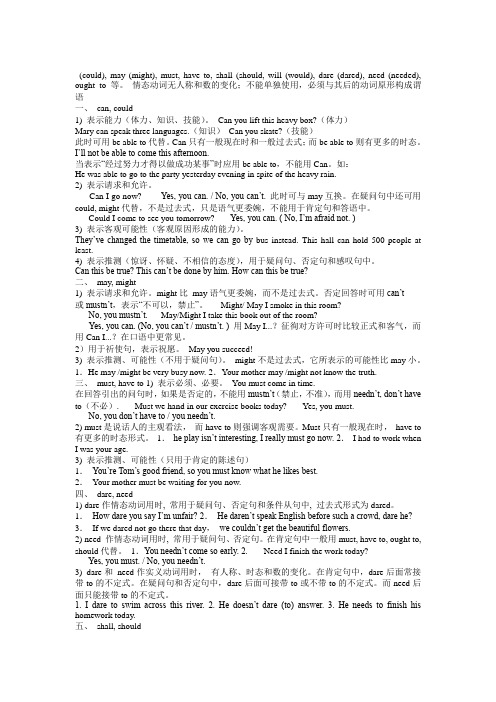
(could), may (might), must, have to, shall (should, will (would), dare (dared), need (needed), ought to等。
情态动词无人称和数的变化;不能单独使用,必须与其后的动词原形构成谓语一、can, could1) 表示能力(体力、知识、技能)。
Can you lift this heavy box?(体力)Mary can speak three languages.(知识)Can you skate?(技能)此时可用be able to代替。
Can只有一般现在时和一般过去式;而be able to则有更多的时态。
I’ll not be able to come this afternoon.当表示“经过努力才得以做成功某事”时应用be able to,不能用Can。
如:He was able to go to the party yesterday evening in spite of the heavy rain.2) 表示请求和允许。
-----Can I go now? ----- Yes, you can. / No, you can’t. 此时可与may互换。
在疑问句中还可用could, might代替,不是过去式,只是语气更委婉,不能用于肯定句和答语中。
---- Could I come to see you tomorrow? ---- Yes, you can. ( No, I’m afraid not. )3) 表示客观可能性(客观原因形成的能力)。
They’ve changed the timetable, so we can go by bus instead. This hall can hold 500 people at least.4) 表示推测(惊讶、怀疑、不相信的态度),用于疑问句、否定句和感叹句中。
情态动词用法和被动语态归纳小结及练习 人教版英语九年级
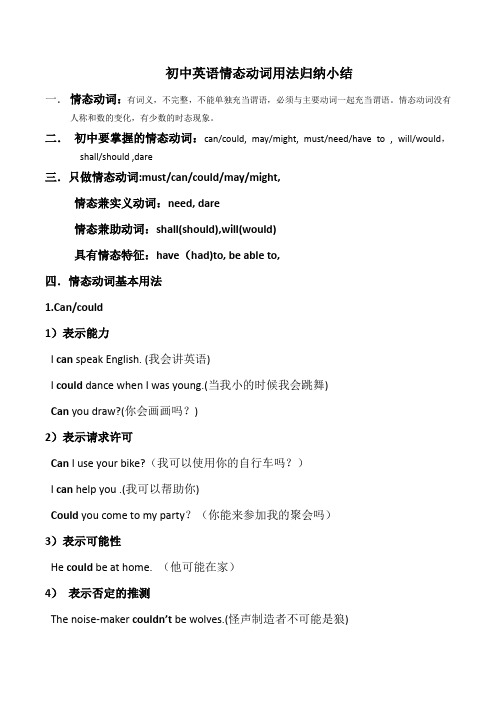
初中英语情态动词用法归纳小结一.情态动词:有词义,不完整,不能单独充当谓语,必须与主要动词一起充当谓语。
情态动词没有人称和数的变化,有少数的时态现象。
二.初中要掌握的情态动词:can/could, may/might, must/need/have to , will/would,shall/should ,dare三.只做情态动词:must/can/could/may/might,情态兼实义动词:need, dare情态兼助动词:shall(should),will(would)具有情态特征:have(had)to, be able to,四.情态动词基本用法1.Can/could1)表示能力I can speak English. (我会讲英语)I could dance when I was young.(当我小的时候我会跳舞)Can you draw?(你会画画吗?)2)表示请求许可Can I use your bike?(我可以使用你的自行车吗?)I can help you .(我可以帮助你)Could you come to my party?(你能来参加我的聚会吗)3)表示可能性He could be at home. (他可能在家)4)表示否定的推测The noise-maker couldn’t be wolves.(怪声制造者不可能是狼)He couldn’t be at home.(他不可能在家)5)表示将来能够要用be able toHe will be able to finish the task in this week.(在这周之内,他将能完成这个任务)2.may/might1)表示许可May/might I use your bike?我可以使用你的自行车吗?(might 更客气)You may come to my home at any time.(你可以在任何时候来我家)2)表示可能性He may/might be ill. 他可能病了。
- 1、下载文档前请自行甄别文档内容的完整性,平台不提供额外的编辑、内容补充、找答案等附加服务。
- 2、"仅部分预览"的文档,不可在线预览部分如存在完整性等问题,可反馈申请退款(可完整预览的文档不适用该条件!)。
- 3、如文档侵犯您的权益,请联系客服反馈,我们会尽快为您处理(人工客服工作时间:9:00-18:30)。
初中英语代词情态动词总结及练习题情态动词专题:情态动词(一)情态动词的定义情态动词表示说话人对某一动作或状态的态度。
(二)情态动词的特点1)有一定词义;2)不受主语人称和数的变化影响;3)与主要动词的原形(或称不带to的不定式)一起构成谓语(除ought to作固定词组看待)。
(三)情态动词的分类和意义意义情态动词(四)情态动词的基本用法1. can (could)1)表示能力,could主要指过去时间。
Two eyes can see more than one. 两只眼比一只眼看得清。
Could the girl read before she went to school? 这女孩上学前能识字吗?2)表示可能(理论上或是逻辑判断上)。
The temperature can fall to –60℃, that is 60℃ below freezing.气温可降至—60℃,也就是零下60℃。
He can’t (couldn’t) have enough money for a new car.他不可能有足够的钱买新车。
Y ou mustn't smoke while you're walking around in the wood. Y ou could start a fire. 在林子里走时勿吸烟,那样可能会引起火灾。
3)表示允许。
Can I have a look at your new pen? 我可以看一看你的新钢笔吗?He asked whether he could take the book out of the reading-room.他问他可不可以把书带出阅览室。
4)表惊异、怀疑、不相信等态度。
主要用于否定句、疑问句或感叹句中。
Where can (could) they have gone to? 他们会去哪儿了呢?He can’t (couldn’t) be over sixty.他不可能超过六十岁。
How can you be so careless? 你怎么这么粗心?5)比较委婉客气地提出问题或陈述看法。
Can (Could) you lend me a hand? 帮我一把好吗?I’m afraid we couldn’t give you an answe r today. 恐怕我们今天不能给你答复。
2. may (might)1)表允许,might可以指过去时间,也可指现在时间,语气更委婉。
Y ou may take whatever you like. 你喜欢什么就拿什么。
He told me that I might smoke in the room. 他告诉我可以在房间里抽烟。
May (Might) I ask for a photo of your baby? 我可以要一张你宝宝的照片吗?在回答以may引起的问句时,多避免用这个词,而用其它方式,如Y es, please. / Certainly./ Please don’t ./ Y ou’d better not. / No, you mustn’t.等,以免显得太严峻或不客气。
2)表可能(事实上)。
可以指过去时间,也可以指现在时间,但语气更加不肯定。
He may be at home. 他可能在家。
She may not know about it. 她可能不知道这件事。
He was afraid they might not agree with him. 他担心他们可能不同意他的意见。
They might be having a meeting, but I’m not sure.他们有可能在开会,不过我不肯定。
3. must1)表示义务。
意为―必须‖(主观意志)。
We must do everything step by step. 我们一切都必须循序渐进地做。
Y ou mustn’t talk to her like that.你不可能那样对她说话。
--Must we hand in our exercise—books now? 我们现在就要交练习本吗?--No, you needn’t. / No, you don’t have to.不必。
(这种情况下,一般不用mustn’t)2)表示揣测。
意为―想必、准是、一定‖等,只用于肯定句。
He must be ill. He looks so pale. 他准是病了。
他的脸色苍白。
She’s wearing a diamond necklace. She must have a lot of money.她戴着钻石项链,一定很有钱。
4. shall1)表征询意见,用于第一、第三人称疑问句。
Shall I get you some tea? 我给你点茶好吗?Shall the boy wait outside? 让那男孩在外面等吗?What shall we do this evening? 我们今晚做什么?2)表说话人的意愿,有―命令、允诺、警告、决心‖等意思,用于第二、第三人称陈述句。
Y ou shall do as I say. 按我说的做。
(命令)Y ou shall have my answer tomorrow. 你明天可以得到我的答复。
(允诺)He shall be sorry for it one day, I tell you. 有一天他会后悔的,我告诉你。
(警告)Nothing shall stop us from carrying out the plan. 什么也不能阻止我们执行这项计划。
(决心)5. will1)表意愿,用于各种人称陈述句。
I will do anything for you. 我愿为你做任何事。
None is so blind as those who won’t see.不愿看的人眼最瞎。
If you will read the book, I’ll lend it to you.如果你愿意读这本书,我会把它借给你。
2)表请求,用于疑问句。
Will you close the window? It’s a bit cold.请你把窗户关上好吗?有点冷。
Won’t you drink some more coffee?再来一点咖啡好吗?3)表示某种倾向或习惯性动作。
Fish will die out of water. 鱼离开水就不能活。
The door won’t open.这门打不开。
The boy will sit there hour after hour looking at the traffic go by.那男孩常常坐在那里好几个钟点,看着车辆行人通过。
6. should1)表义务。
意为―应该‖(某件事宜于做),用于各种人称。
Y ou should be polite to your teachers. 你对老师应该有礼貌。
Y ou shouldn’t waste any tim e. 你不应该浪费时间。
2)表推测,意为―想必一定、照说应该、估计‖等。
The film should be very good as it is starring first-class actors.这部新电影是一流演员主演的,估计拍得很好。
They should be home by now. 照说他们现在应当已经到家了。
7.would1)表意愿。
They would not let him in because he was poorly dressed. 他们不让他进去因为他衣着破旧。
I said I would do anything for you. 我说过我愿意为你做任何事。
2)表委婉地提出请求、建议或看法。
Would you like another glass of beer? 再来杯啤酒好吗?Would you mind cleaning the window? 请把窗户擦一下好吗?They wouldn’t have anything against it.他们不会有什么反对意见。
3)表过去反复发生的动作或过去的一种倾向。
Every time she was in trouble, she would go to him for help.她每遇到麻烦都会向她求助。
他告诉我盒子打不开了。
8. ought to1)表义务,意为―应该‖(因责任、义务等该做),口气比should稍重。
Y ou are his father. Y ou ought to take care of him. 你是他父亲,应当管他。
Y ou oughtn’t to smoke so much.你不应该抽这么多烟。
2)表推测,暗含很大的可能,语气较弱。
Han Mei ought to know his telephone number. 韩梅该知道他的电话号码。
There’s a fine sunset; it ought to be a fine day tomorrow.今天有晚霞,明天应该是个好天。
9. used to表示过去的习惯动作或状态,现在不复发生或存在。
疑问式和否定式有两种。
He used to live in the countryside, but now he lives in the city.他过去住在乡下,现在住在城里。
There used to be a building at the street corner, but it has been pulled down.街道拐角处过去有座楼房,现在拆了。
I usedn’t (didn’t use) to smoke.我过去不抽烟。
Used you (Did you use) to go to school on foot? 你过去常步行去学校吗?(一)need和dare的用法need和dare既可用作情态动词,也可用作实义动词。
用作情态动词时,主要用于否定句和疑问句。
用作实义动词时,可用于各种句式。
1.用作情态动词--Need I come? --Y es, you must. --我需要来吗? --需要。
Y ou needn’t telephone him now.你现在不必打电话给他。
I don’t think you need worry.我想你不必发愁。
She dare not go out alone at night. 她晚上不敢一个人出去。
How dare you say I’m unfai r? 你竟敢说我不公平?Not one of them dared mention this. 他们谁也不敢提这件事。
